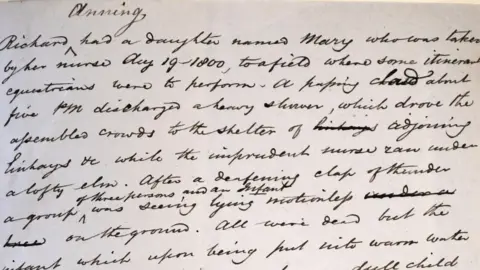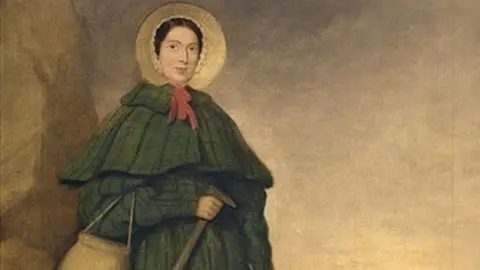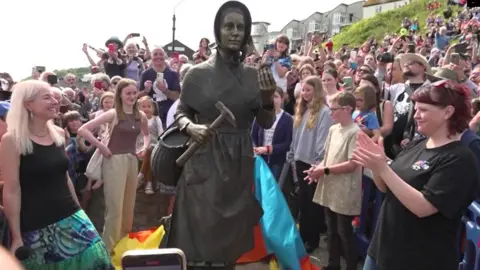Mary Anning: Lyme Regis fossil hunter's rare biography published
 University of Bristol
University of BristolA rare, contemporary biography of pioneering scientist Mary Anning, has been unearthed and published.
The four-page document was written by fellow resident of Lyme Regis in Dorset, George Roberts.
Anning's discoveries of fossils in the early 19th Century helped shape early palaeontology but there were few accounts of her life.
Prof Michael Benton, of the University of Bristol, said it was a "valuable" memoir.
The biography, held in the university's archives, is thought to date from between 1837 and 1847 and was written by local author George Roberts, who ran a private school opposite Anning's fossil shop in Lyme Regis.
It was apparently intended for a book but was altered into an obituary after Anning's death, but was never previously published in full.
 NHM
NHMIn the hand-written document, he describes how she was a struck by lightning as a baby and went on to become a "lively and intelligent" child.
It also documents how, at the age of 10, she began collecting fossils and sold her first find - an ammonite - to a passing lady in the street for half a crown.
Describing her as a "celebrated fossilist", there are further details of her discoveries, including the first ichthyosaur fossil studied by scientists.

Anning, whose life inspired the feature film Ammonite, was never fully credited for her discoveries due to the fact she was woman and because of her social status.
The Mary Anning Rocks campaign last year unveiled a statue of her as a tribute to her as a role model for women in science.
Prof Benton said: "One or two visitors to Lyme Regis mentioned Mary Anning and her little fossil shop, and she was obviously widely known to natural scientists in London, Bristol, Oxford and Cambridge. But normally they would not inquire into her life in any detail.
The biography, and Dr Benton and Dr Michael Taylor's study of the document, has been published online by the University of Bristol.

Follow BBC South on Facebook, Twitter, or Instagram. Send your story ideas to [email protected].
